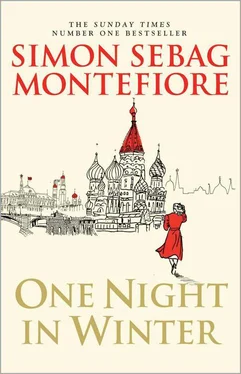‘You do?’
‘Yes,’ said Golden. ‘Because I haven’t been back in Moscow for long myself.’
Andrei looked up at the teacher, at his receding, light hair now greying, his dimpled chin, his lined face. His smile seemed genuine – but was it? Andrei knew it was better to say nothing more. Consulting his timetable, he hurried to find his next class.
At lunchtime, Andrei ate his sandwich of black bread with a gherkin at his desk, content to be on his own for a moment while Nikolasha and his friends Vlad, George and Rosa pushed some desks together to form an ink-stained table where they shared their fish, beef, cheese and tomatoes. It seemed that Nikolasha was never alone, never without an entourage of pale, floppy-haired creatures who looked as if they never took any exercise or ventured outside. Nikolasha was reading to them from his red velvet notebook and they whispered excitedly. Andrei felt pangs of disdain and envy – but he remembered his father and he knew neither of these sentiments was worthy of him. He finished his sandwich and as he walked past them, he saw Nikolasha giving his notebook to George.
‘You can read it, George,’ he was saying, ‘but take it seriously and I want it back tomorrow. With your comments.’
‘Of course, of course,’ replied George jovially.
Afterwards, as Andrei was hurrying up the corridor to his next lesson, he heard the squish of plastic soles on the parquet floor behind him. He turned and a white, freckled face hove into view. Nikolasha Blagov was so tall that he hunched over as he walked. As always he was followed by the dark-haired cadaverous figure of Vlad, as well as the fey Rosa Shako.
‘What do you think of Teacher Golden?’ Nikolasha asked lugubriously. His voice was so deep that his words came out slurred as if his tongue were a wooden spoon. Vlad and Rosa both leaned in to hear his answer.
Andrei hesitated, cautious of making some terrible mistake on his first day. ‘Interesting,’ he said finally.
Nikolasha shook his head as if disappointed. ‘Is that all you have to say?’ He leaned over as if about to impart a most perilous secret. ‘You’d best be careful. Things are different here.’
‘Has Serafima said anything to you yet?’ asked Vlad.
‘Serafima? I don’t even know Serafima.’
‘Serafima really understands poetry,’ said Nikolasha solemnly. ‘Well, you obviously haven’t made the grade, even if you can pull a few Pushkin quotes out of the air.’
‘What grade?’
‘You’ll see. Think on it.’
He and Vlad slunk off around the corner. Rosa lingered a moment and touched Andrei’s hand. ‘He takes it all very seriously but he’s so clever and original, you’ll see.’
Andrei’s first day at School 801 was almost over. His last lesson: Communist ethics with Dr Rimm, a pedant compared with Benya Golden, Andrei thought. Rimm’s sand-coloured Stalinka tunic was so tight that it only accentuated the lumpiness of his figure. The class stood to attention when he entered and remained standing until he moved his hand downwards in a silent gesture of command. After a turgid hour, during which Demian Dorov and Marlen Satinov competed with Dr Rimm to quote from the works of Stalin and Lenin, while the rest of the class yawned, wrote notes to each other and tried to stay awake, Andrei was the last out of the room.
As he left, he noticed Nikolasha’s red velvet notebook on the floor next to George Satinov’s desk. I’ll return it to them tomorrow, he thought and put it in his satchel.
FIVE P.M. AT the Golden Gates. This, thought Andrei, watching the limousines picking up his schoolmates, truly was the age of new freedoms, new pleasures. Chauffeurs and army batmen leaned against the curvaceous flanks of their Packards and Lincolns, smoking cigarettes, sweating in the sun. There were some mothers waiting but most Bolshevik women worked. The nannies, a tribe of florid Matryoshkas, peasant women in housecoats, stood separately, laughing at their own jokes. You couldn’t mistake them for the mothers, thought Andrei, and the two groups never spoke.
He stopped between the gold-tipped pillars of the gates, looking for – what? His mother to turn up and collect him in a giant limousine? No chance of that, but he had half expected she might take time off work to meet him. Still, he was relieved that she wasn’t there. Instead he was hoping that he might see Serafima and her film-star mother again… when she slipped right past him.
‘You do know your Onegin ,’ Serafima said softly. ‘I’ll bet Nikolasha’s jealous.’ He noticed, all over again, her heart-shaped face, her white skin, and those amused green eyes. She did not stop to hear his answer, which was just as well because he could not think how to respond. Later, a host of witty answers would come to him.
The Rolls was waiting for her, the chauffeur leaning on the grille, cigarette between his metal fangs. There was no sign of her parents. But she did not seem pleased: ‘Thanks for coming, Khirochenko,’ she said. ‘But I’ll walk. Tell Mama I don’t need the car.’ The driver shrugged as she walked away from him into the balmy streets; the poplar blossoms whirled around her like a haphazard escort.
As the chauffeurs pulled away, Andrei yearned to be part of the lives of these golden children. Calm down, he told himself, you’re in their school, you’re in their lives. Soon you too will be in their group.
Holding his school satchel, he walked through the streets. He could feel the heat rising from the paving stones. Around him, the capital of Soviet victory looked like a defeated city. He saw crumbling buildings, their façades peppered with shrapnel, windows shattered, roads pockmarked with bomb craters. Everything – the walls, the houses, the cars – everything except the scarlet banners was drab, beige, peeling, khaki, grey. But the faces of the passersby were rosy as if victory and sunlight almost made up for the lack of food, and the streets were crowded with pretty girls in skimpy dresses, soldiers, sailors and officers in white summer uniforms. Studebaker trucks, Willys jeeps and the Buicks of officials rumbled by – but there were also carriages pulled by horses, carts heaped with hay or bedding or turnips, right in the middle of this spired city with its gold domes. Sometimes, when he closed his eyes in the heat and the world went a soft orange, Andrei heard laughter and singing and he was sure he could hear the city itself healing in the sunshine. Down Ostozhenka he walked, then round past the National Hotel and the Kremlin, and up Gorky Street, past the House of Books on the right, and the City Soviet on the left.
When he peered through one of the archways, he saw goats and cattle in the yard, wrangled by an old peasant with a red kerchief on her head and a crook in her hand. Yet this was the city that had defeated the Hitlerites and stormed Berlin! What pride he felt in the greatness of his Motherland, what horror at its cruelties. The old hag squatted to piss, still with a cigarette between two stumps of teeth. Andrei sighed: he loved his Moscow. He was almost home.
He turned into the next archway, walked into the courtyard through the vegetable gardens planted amongst the heating pipes, and then entered the doorway of a 1930s apartment block. He climbed the concrete stairs with its fermented vegetable smell of shchi soup and vinegary urine to the second floor where he shouldered open the door of their apartment. A radio was on, Levitan was reading the news in his authoritative, sonorous voice and there was a row going on. In a corridor that had neither carpet nor paint, Ivanov, a middle-aged scientist from Rostov, was screaming at one of the skinny Goldberg children: ‘You little cockroach, you drank my milk. I’ll report you to the committee. I’ll have you slung out of here…’
Читать дальше












